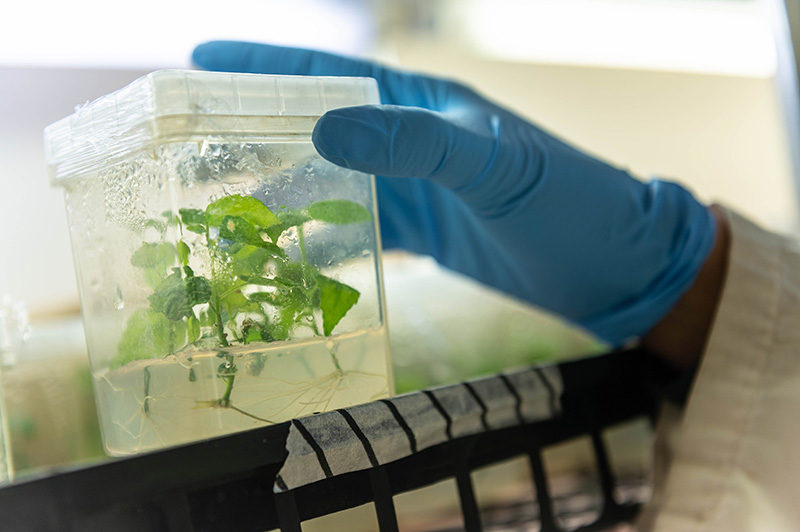
In recent weeks, policy-makers and pundits have focused their attention on how sustainable development can breathe new life into global economies, setting the stage for a healthier post-COVID society.
At UBC's BioProducts Institute (BPI), researchers are hard at work developing the kinds of green technologies that could become an integral part of a more sustainable economy, using resources and expertise that are uniquely abundant in British Columbia. Following years of innovations in the field, and having been recently approved as UBC's newest Global Research Excellence (GREx) Institute, the group is developing the resources, tools and infrastructure to make essential contributions to B.C.'s status as a hub for global developments in this critical area.
We spoke with BPI Scientific Director Orlando Rojas, who was recently recruited to UBC as the Canada Excellence Research Chair in Forest Bioproducts, about the Institute and his vision for a green future through the BioProducts Institute.
What is a bioproduct, and can you give an example of where we might see it used?
At their core, bioproducts are exactly what they sound like — materials, chemicals and energy derived from biological resources. While these could include materials made from seashells or crop residues such as discarded soy husks or soy hulls, here in B.C., we tend to focus on products and materials made from all of the parts of a tree (called forest biomass). Forest biomass can be used sustainably and as a viable alternative to fossil carbon.
The products made from biomass sources have a wide range of uses, far more than you might expect. They can be made into everything from biofuels to engineered wood to buildings, textiles, or even incorporated into advanced materials, foodstuffs or technologies for energy harvesting and storage. The range of applications and possibilities for bioproducts are immeasurable, and even include the ways we interact with these materials and the spaces in which we live. At the BioProducts Institute, we want our research to pave the way towards a time when, wherever we live, everything we touch, smell, and interact with will be based on bioresources and green technologies that we know positively contribute to our environment.
You recently joined UBC from Aalto University in Finland. How does B.C. compare to Finland or other countries in terms of its potential for bioproducts research and applications?
UBC has a team of fantastic, dedicated researchers, and an excellent knowledge base in bioproducts and sustainability. We have experts in the fundamental sciences, such as forestry and genomics, as well as experts in the creation of new technologies, biorefineries, food science, and sustainable business and economics. All of these people are incredibly well-connected. It makes UBC a dream location to play in this field and truly explore the possibilities of this research.
Finland is at the top of the charts for innovation, with a clear focus on creating a bioeconomy — an economy based on developing renewable resources and the value-added, sustainable products based on those renewable sources and their residues. In Europe, generally, there's an accelerated pace to growing the green economy. All of the different players — industry, government, academia— are integrated for this mission. I hope to bring that sense of integration and collaboration here. In fact, we've already begun to establish ties that will help us learn from each others' strengths, and exchange ideas and talent.
The BioProducts Institute recently became UBC's newest Global Research Excellence Institute (Stewart Blusson Quantum Matter Institute is the other). Tell us more about that designation; how will it equip you to make an impact with your research in the long term?
Becoming a Global Research Excellence (GREx) Institute at UBC opens up new possibilities for our researchers. It gives us the means to propel UBC forward into international excellence in bioproducts research and innovation. It also means that we're supported by professional resources in the GREx Secretariat that allow our team to focus on conducting world-class research, and are able to recruit top talent based on our reputation as a hub for excellence in bioproducts research.
In the short term, our focus is to continue engaging in high-impact fundamental and applied research in bioproducts while building a foundation from which to expand. We're focused on applications where forest biomass can solve local issues. In fact, we recently tested out the potential for making biodegradable face masks from wood fibres to address potential PPE shortages in B.C. as well as growing concerns over ocean waste from single-use plastics.
In the future, we’d like to do more and bigger things using the kind of approach we touched on with the face-mask research. Researchers from BPI will work with communities across B.C., including Indigenous communities, to identify, develop, and inform the research in a way that creates value for everyone involved. There is already so much untapped knowledge and a willingness to work together, we just need to bring people with a shared vision and in the right ways to make it happen.
Becoming a GREx Institute helps us to develop partnerships, attract industry and government investment, and create a cohesive group of team players focused on our goal of research excellence and impact. As the Institute's scientific director, my first mission is to integrate the people in this ecosystem and help them develop the resources and tools they need to succeed. From there, our work together can position the university, as well as B.C. and Canada, as the hub of excellence in bioproducts research and innovation.
Related: Pulp and Paper Canada: Is the bioeconomy the future of pulp and paper?